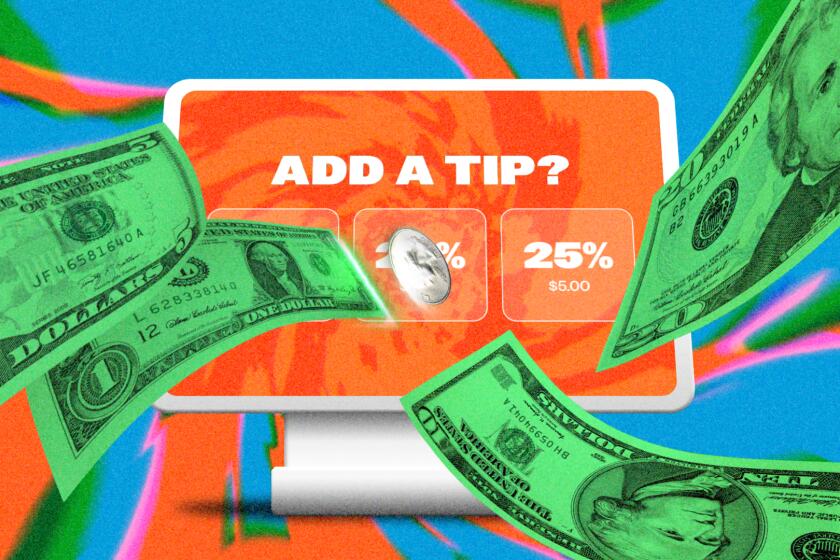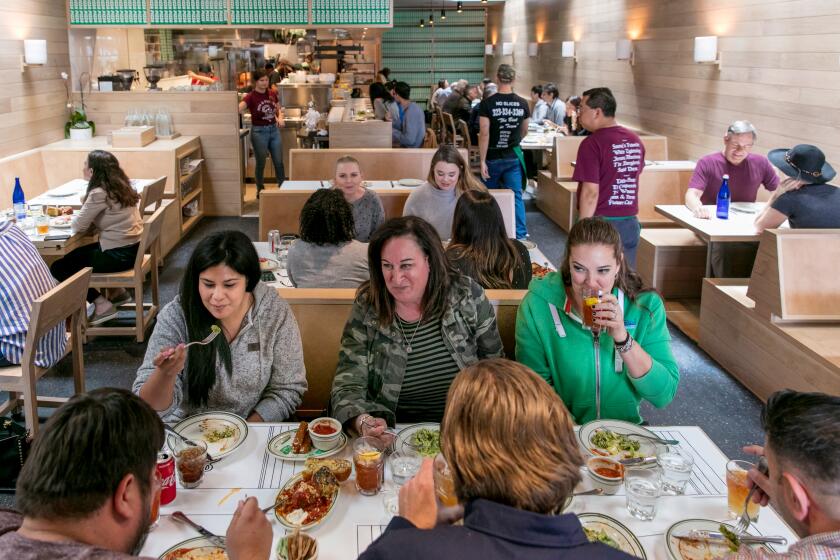Trump promised no tax on tips. Why few tipped restaurant workers will likely benefit

While many workers hoped for tax-free tips, experts warn the proposal could disproportionately benefit higher earners and exacerbate inequalities in the service industry.
- Share via
- President-elect Donald Trump campaigned on removing taxes on tips; many Democrats agree with the idea.
- Economists and tax experts say eliminating income tax on tips will not benefit most tipped restaurant workers.
- Only 2.5% of the labor market stands be benefit from a no income tax on tips provision, experts say.
On a good night, Chris Lopez, a bartender and server in Southern California for eight years, can make $200 to $400 in tips.
So when the 31-year-old, who lives in Orange, first heard the news about President-elect Donald Trump’s campaign promise of “no tax on tips,” he got excited.
“That’s a great idea,” he thought to himself.
But when he found out more about the proposal, he wondered if he would benefit at all.
In June, Trump told rally goers in Las Vegas — a city with the highest proportion of restaurant, hotel and casino workers in the country — that, if elected, he would eliminate federal taxes on tipped income. Initially, the news was met with excitement by Lopez and several in the service industry where tips can make a good portion of take-home pay.
The norms around whom, and how much, Americans tip have shifted in recent years — and consumers are increasingly confused.
Democratic opponent Vice President Kamala Harris followed up with a similar no-tax-on-tips promise — also at a rally in Nevada, a critical swing state.
In Congress, the no-tax-on-tips idea gained political steam on both sides of the political aisle with bills introduced in the House and the Senate. Sen. Ted Cruz (R-Texas) was the first to introduce the No Tax on Tips Act in July with support of Democratic Sens. Catherine Cortez Masto and Jacky Rosen, of Nevada. The legislation exempts tipped wages from federal income tax, but not payroll taxes, which fund Medicare and Social Security. Around the same time, Rep. Thomas Massie (R-Ky.) introduced a House bill that excludes tips not only from federal income tax but payroll taxes as well.
Economists and tax experts have criticized the bills. The Tax Foundation estimates that untaxed tip income could add $107 billion over the next decade to the federal deficit. Others argue that tipped income should be taxed like any other form of labor compensation and point out that the bills have few guardrails to prevent professionals who have high incomes — such as attorneys or hedge fund managers — from shifting their compensation to a tipping model to avoid income tax on those earnings.
In September, Democratic Rep. Steven Horsford and six Democratic co-sponsors introduced the Tipped Income Protection and Support Act, which addresses a few of these concerns. Although it allows workers to deduct income earned from tips like the other bills, it limits the deduction to individuals with an adjusted gross income less than $112,500 and restricts the allowance to those who “traditionally and customarily received tips.” It also eliminates the separate subminimum wage paid to tipped workers. The bill was introduced with no Republican support.
Trump has yet to say whether he would want Congress to consider a Cruz-like bill that applies only to income tax or legislation that, like Massie’s bill, also applies to federal payroll taxes.
After cutting taxes mostly for the rich in his first term, former President Trump says he will help others by exempting tips, overtime and Social Security from taxes.
Tax experts believe it will be legislatively impossible to eliminate payroll tax on tips because there are strict rules on budget reconciliation that don’t allow Social Security to be impacted.
Doing away with income tax on tips, however, is an easier lift, said Ben Ritz, vice president of policy development for the Progressive Policy Institute.
“I do think this is more likely than not to happen at this point,” Ritz said. “For Trump this was a very brazen pander to the Nevada service workers. I think him having won Nevada and this being one of the core tax policies that he actually had in the Republican platform, I think it is one of the most likely for him to turn the screws on Congress. If he is going to fight Congress on something, I could see him spending capital on it.”
Howard Gleckman, a senior fellow at the Urban-Brookings Tax Policy Center said if the proposal only focuses on income tax — and not elimination of payroll tax — the cut won’t be as significant.
“It’s one of those things where there is a lot less to it than meets the eye,” he said.
The L.A. city attorney is looking into a hospitality group that runs some of the trendiest restaurants in Hollywood over healthcare service fees tacked on to diners’ bills.
First, the provision would affect a small number of employees in the country. In 2023, there were an estimated four million tipped workers in the United States — including restaurant servers, bartenders, hairdressers, taxicab and rideshare drivers — about 2.5% of the labor market, according to the Budget Lab at Yale University.
And of those tipped-wage earners, tax analysts and economists said, the tax cut would not help a large portion of them. An estimated 40% of tipped-workers would get no benefit from such a proposal because they make so little money that they already don’t pay any income tax, Gleckman said his analysis found.
“So if you already are not paying any income tax, telling you you don’t have to pay income tax doesn’t do you any good,” he said, “because you’re already at zero.”
If you look at the restaurant industry alone, there are about 2.2 million wait staff in the U.S. and about half earn less than $37,000 a year, according to 2023 Bureau of Labor statistics. If they claim the standard deduction, these workers make too little to have to pay much federal income tax. Many are likely to claim other forms of tax relief, such as the Earned Income Tax Credit and Child Tax Credit, which would likely bring them to zero income tax.
Those who stand to benefit the most, Gleckman said, are tipped wage earners who make more money, such as waiters at higher-end restaurants.
That’s a small fraction of wait staff — about 10% of wait staff make $60,000 or more annually, according to the Bureau of Labor Statistics.
“So if that’s you …if you’re a waiter at the French Laundry or somewhere where dinner is like $300, a 20% tip is pretty good money. That’s $60,” he said. “But if you’re a waiter at Mom’s restaurant where the blue plate special is $9.95, the tip is $2.”
Restaurant union and industry leaders are also leery and some believe the move could actually end up hurting restaurant workers in the long run.
Erika Polmar, executive director and founding member of the Independent Restaurant Coalition, said she’s pleased that the issue of tipping is part of the national conversation, because it means people are thinking about restaurant workers.
“When it comes to the actual tax policy, at this point I struggle to see how this is the appropriate solution,” she said. “ If you eliminate taxation on tips but don’t make any other policy changes to allow for other compensation models, you’re actually harming the same people who you are trying to help.”
Polmar said many of the restaurant and bar operators who make up the coalition’s membership are eager to move away from tipping because of the challenges it presents — such as inequities between front-of-the-house workers who tend to make more in tips to back-of-the-house workers who make very little, if any money, in tips.
Caroline Styne, a restaurateur who is co-owner and wine director of the Lucques Group of restaurants, said no income tax on tips would likely “create a lot of animosity from the employees who do not receive tips.”
Workers who work front and back of house share tips at Styne’s restaurants, but that may not be the case at other restaurants.
Even if there is tip sharing, a dishwasher who works in the back of the kitchen tends to make significantly less than workers in the front, particularly servers, said Mary Sue Milliken, chef and co-founder of Mundo Hospitality Group, whose restaurants include Socalo, Border Grill and Alice B.
“It just doesn’t seem like it’s fair,” Milliken said. “I don’t understand why. Why should a tip earner get a tax break but the dishwasher doesn’t?”
Gleckman adds that the legislation could also exacerbate a tipping backlash by diners: “There may be some customers at restaurants who, will say, ‘Hey, wait a minute? Why is the server getting tax-free income and I’m not?’ ”
There’s already a backlash to tipping culture, which many experts have said has gotten out of control.
The restaurant says the 18% service fee attached to checks is part of a vision to make pay more equitable among all workers. The suit filed Tuesday in L.A. seeks damages for what servers claim are tips.
Still, for all of her doubts, Milliken believes that the proposal was put forward with “the right kind of spirit,” to try to help the restaurant industry, which is struggling.
“We need the federal and local governments to look at how restaurants can survive better and how we can pay a better living wage,” she said. “I don’t think this proposal makes any sense. The higher wage earners will get a benefit and the lower wage earners won’t be able to use it in any meaningful way.”
Maria Hernandez, a spokesperson with Unite Here Local 11, said the group — which represents 32,000 hospitality workers in Southern California and Arizona — is supportive of eliminating taxes on tips.
“But the real solution,” she said, “is to raise the federal minimum wage, which has been stuck at $7.25 for decades.”
The proposal could also slow efforts by several states to raise the minimum wage for tipped workers.
The state minimum wage for tipped workers varies — from $16.28 in Washington state to $2.13 in Oklahoma. In Los Angeles, the minimum wage for tipped workers is $16.78.
“So if you tell tip workers, your tips are going to be exempt and your wage will be taxable, most would say, ‘I’d rather take the tax exempt tips than a larger minimum wage,’ which is not to their benefit,” Gleckman said. “The siren song of no taxes really often overwhelms the real financial benefit of making a particular decision.”
More to Read
Eat your way across L.A.
Get our weekly Tasting Notes newsletter for reviews, news and more.
You may occasionally receive promotional content from the Los Angeles Times.















